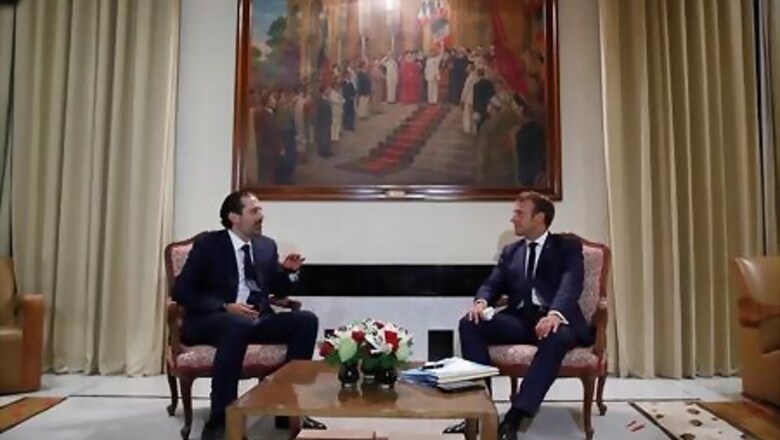
views
BEIRUT: French President Emmanuel Macron marked Lebanon’s centenary on Tuesday by planting a cedar tree, the emblem of the Middle East country that is collapsing under the weight of a crippling economic crisis.
In his second trip to Lebanon in less than a month, Macron is expected to lean on Lebanon’s fractious leaders to carry out economic reforms that are vital to getting the nation out of crisis and unlocking foreign aid.
“It’s the last chance for this system,” Macron told POLITICO in an interview while travelling to Beirut on Monday. “It’s a risky bet I’m making, I am aware of it … I am putting the only thing I have on the table: my political capital.”
With its economy in deep crisis, a swathe of Beirut in tatters following a huge explosion at the port on Aug. 4, and sectarian tensions rising, Lebanon is facing the biggest threat to its stability since the 1975-1990 civil war.
Macron, who previously visited in the immediate aftermath of the blast that killed more than 190 people and injured 6,000, planted the cedar sapling at a forest reserve in the mountains northeast of Beirut.
The French president’s Elysée palace said Macron had planted the tree to show his “confidence in the future of the country”.
The French air force display team flew overhead, leaving smoke trails of red, white and green, the national colours of Lebanon whose borders were proclaimed by France 100 years ago in an imperial carve-up with Britain.
Lebanon gained independence in 1943.
TRANSCENDING DIVISIONS
Macron, who has been at the centre of international efforts to press Lebanese leaders to tackle corruption and take other steps to fix their country, began his trip late on Monday by meeting Fairouz, 85, one of the Arab world’s most famous singers whose music transcends Lebanon’s deep divisions.
He was greeted by dozens of protesters gathered outside with placards reading “No cabinet by, or with, the murderers” and “Don’t be on the wrong side of history!”
He told reporters on Monday he wanted to “ensure that the government that is formed will implement the necessary reforms.”
In the hours before his arrival on Monday, Lebanese leaders designated a new prime minister, Mustapha Adib, reaching a consensus among major parties that senior Lebanese politicians said was forged under pressure from Macron over the weekend.
Macron’s agenda includes a tour of the devastated Beirut port, the site of the catastrophic Aug. 4 chemicals explosion, a meeting with President Michel Aoun for a centenary reception, and an afternoon of political meetings with Lebanon’s various factions.
After being designated on Monday, Adib called for the rapid formation of a government, the immediate implementation of reforms and an agreement with the International Monetary Fund.
Lebanon’s economic crisis is rooted in decades of state corruption and waste that landed the state with one of the world’s heaviest public debt burdens.
Since October, the currency has collapsed and depositors have been frozen out of their savings and seen their cash value collapse in a paralysed banking system, while poverty and unemployment have soared.
France’s foreign minister said last week that Lebanon risked disappearing because of the inaction of its political elite who needed to quickly form a new government to implement reforms.
Disclaimer: This post has been auto-published from an agency feed without any modifications to the text and has not been reviewed by an editor













Comments
0 comment